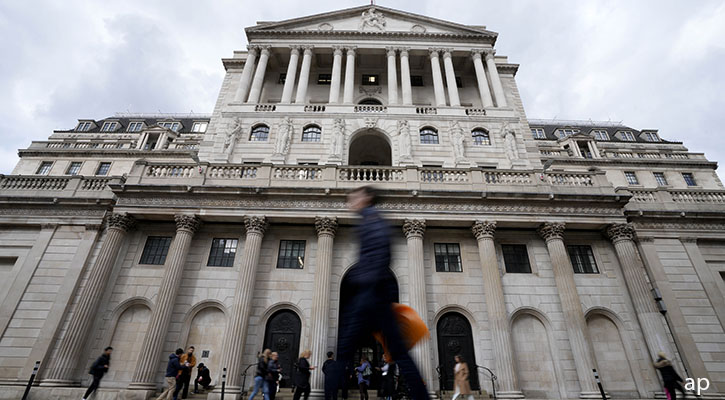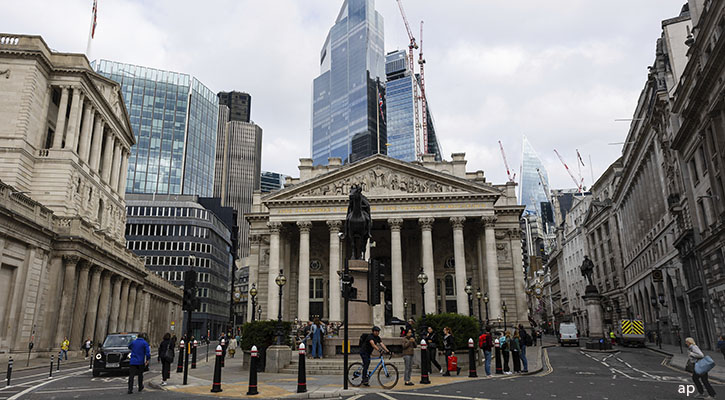
The pound has fallen again after the Bank of England governor warned that its emergency support package for the markets would end on Friday.
The Bank intervened for the second time in as many days to prevent "fire sales" of pension fund assets, amid the continuing market turmoil in the wake of Chancellor Kwasi Kwarteng's mini-budget.
But speaking later in Washington, governor Andrew Bailey warned there could be no further extension beyond the end of the week.
"My message to the (pension) funds involved – you've got three days left now. You have got to get this done.
"Part of the essence of a financial stability intervention is that it is clearly temporary."
Following his remarks sterling fell more than a cent against the dollar to its lowest rate since September 29. At 9am the pound was at $1.10, while the 10-year gilt was yielding 4.43%, just one basis point higher on the day. UK market indices were marginally lower on Tuesday's close.
Still, there remained some conflicting reports in the media on Wednesday morning, with some news reports suggesting the Bank would extend the deadline beyond October 14.
End of the Month?
Earlier the Pensions & Lifetime Savings Association, representing the industry, welcomed the bank's latest intervention but warned against ending it "too soon".
In a statement, it suggested it should be extended at least until October 31 – when Kwarteng is due to explain how he intends to get the public finances back on track following his £43 billion tax giveaway.
Alternatively, it said "additional measures should be put in place to manage market volatility".
The bank said it was acting as a sell-off in the UK government bond market poses a "material risk to UK financial stability" after yields on long-dated gilts soared once more on Monday, despite action by the bank and government to try to allay investor concerns.
Threadneedle Street said it will now widen the scope of its bond-buying programme to include purchases of index-linked gilts – a type of UK government bond that tracks inflation.
On Monday, it doubled its daily bond-buying limit to £10 billion, while Kwarteng brought forward his new fiscal plan and independent economic forecasts to October 31 in an attempt to calm turbulent markets.
The Bank said: "The beginning of this week has seen a further significant repricing of UK government debt, particularly index-linked gilts.
"Dysfunction in this market, and the prospect of self-reinforcing 'fire sale' dynamics pose a material risk to UK financial stability."
It added that its latest efforts will "act as a further backstop to restore orderly market conditions".
IFS Warning
The move came as the Institute for Fiscal Studies think tank warned that the chancellor will have to find spending cuts of more than £60 billion if he is to meet his target to get the public finances back under control.
Neil Wilson, chief market analyst at Markets.com, said the bank's third tranche of bond-buying action "seems rather messy and panicky".
He said: "As expected, the market was always going to retest the bank's resolve and put the budget to the sword.
"To expand your emergency intervention in the market once is unfortunate, to do so twice looks like carelessness."
Shadow chief secretary to the Treasury Pat McFadden said: "That the Bank of England has been forced to step in for a second day running to reassure markets shows the government's approach is not working, and creates renewed pressure for the chancellor to reverse his budget."
Threadneedle Street intervened with emergency action on September 28 when the mini-Budget market chaos caused the pound to tumble and yields on gilts to soar, which left some pension funds across the industry close to collapse.
The market turmoil had forced pension funds to sell gilts to head off worries over their solvency.
Investment banks made calls on so-called liability-driven investment funds, which in turn called on pension funds, forcing them into a fire sale of gilts, driving prices still lower and yields higher and creating a downward spiral.
The Bank laid bare the scale of the woes last week when it said its emergency scheme helped the UK narrowly avoid a market meltdown caused by concerns over the chancellor's tax cut plans.
But gilt yields started to surge once more due to ongoing fears over the government's economic policies and worries that the October 14 deadline set by the bank for its bond-buying scheme could see a return to pension fund woes.
In particular, index-linked gilts have picked up sharply, sparking the latest action to stabilise the market, while the bank also signalled other bonds have come under pressure, announcing it would pause its corporate bond sales this week.
"The bank continues to monitor developments in financial markets very closely in light of the significant asset repricing of recent weeks," the Bank said.
August GDP Falls
The UK economy registered a surprise decline in August, during what was a poor month for the consumer-facing sector, according to the Office for National Statistics on Wednesday.
The UK economy shrank by 0.3% in August from July, following a downwardly revised 0.1% climb in July from June. Month-on-month growth in July was initially forecast at 0.2%.
August's gross domestic product was expected to have remained unchanged from July.
"There has been a continued slowing in the underlying three-month on three-month growth, where GDP also fell by 0.3% in the three months to August compared with the three months to May 2022," the ONS noted.
In August alone, output in consumer-facing services fell 1.8%, having risen 0.7% in July.
According to the ONS, industrial production dropped 1.8% on a monthly basis in August, a worse result than the FXStreet-cited market forecast of a smaller 0.2% decline. In July, production fell 0.3% from June.
On an annual basis, industrial production slumped 5.2%, massively missing the mark. Growth of 0.6% was expected, according to FXStreet. That would have been a slowdown from a 1.1% yearly industrial output climb in July.
Adding to the bleak economic picture on Wednesday, the ONS said the UK's goods trade deficit widened.
Exports rose 2.2% on a monthly basis in August to GBP68.24 billion from £66.80 billion in July. Imports rose at a faster pace, however, climbing 4.5% to £75.32 billion from £72.24 billion.
It meant the UK's trade deficit amounted to £7.08 billion in August, stretching from £5.45 billion in July.

























